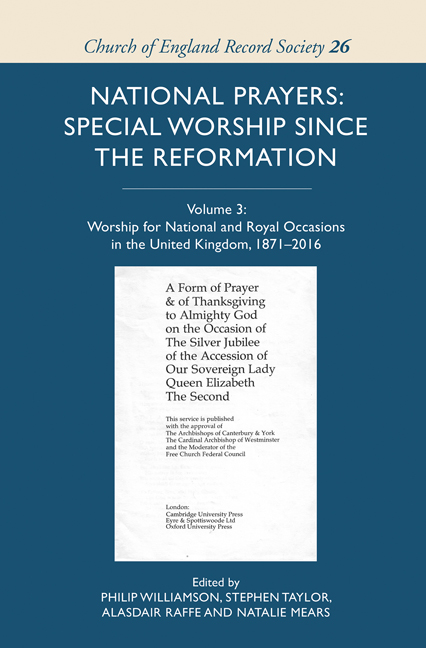 National Prayers
National Prayers Book contents
- Frontmatter
- Dedication
- Contents
- List of illustrations
- Preface
- The project group
- Additions and corrections
- Summary list of particular occasions of worship, 1871–2016
- Reader’s guide and editorial conventions
- List of abbreviations
- Introduction: 1871–2016
- Special worship and the Book of Common Prayer
- Texts and Commentaries, 1871–2016
- Miscellaneous Endmatter
Introduction: 1871–2016
Published online by Cambridge University Press: 14 May 2024
- Frontmatter
- Dedication
- Contents
- List of illustrations
- Preface
- The project group
- Additions and corrections
- Summary list of particular occasions of worship, 1871–2016
- Reader’s guide and editorial conventions
- List of abbreviations
- Introduction: 1871–2016
- Special worship and the Book of Common Prayer
- Texts and Commentaries, 1871–2016
- Miscellaneous Endmatter
Summary
‘National prayers’ are special acts of worship on matters of national significance, which were ordered or encouraged by the sovereign, the government or the leaders of the established churches for observance on specific dates or for particular periods in all places of worship of the established church in a kingdom, or for large areas of a kingdom or its capital city, and which were ‘national’ in the multiple meanings created by consolidations of the kingdoms of the British Isles into larger units – applying both separately to England and Wales, to Scotland and to Ireland and collectively to Great Britain and to the United Kingdom of Britain and Ireland. This is the most straightforward description, although there are complications that are outlined in volume 1 of this edition, pp. xlvii–xlviii, and explained further elsewhere in the Introduction to that volume and in the Introduction to volume 2. Notwithstanding these complications, from 1660 to the 1860s the ordering, nomenclature, organization and texts for special acts of national worship settled into reasonably clear patterns, shaped by precedent and long-established practices. From the 1870s, however, the character and arrangement of national prayers changed considerably, as large shifts took place in the relationships between the state, the churches and members of the nation, in the authorization and styles of worship, in the religious understandings of the established churches and in the means of communication.
Since the sixteenth century, special occasions of national worship had chiefly been ordered by the state. Although the sovereign or the government continued occasionally from the 1870s to order, authorize, organize or encourage special services or prayers, these were now more often initiated by leaders of the established churches. The number of established churches was reduced. Most notably, the Church of Ireland – for which documents and commentaries were included in the first two volumes of this edition – was disestablished at the beginning of 1871, and accordingly ceases to be a focus for this volume. The two established churches that remained, the Church of England (reduced in scope by the creation of the disestablished Church in Wales in 1920) and the Church of Scotland, became less able to claim that they encompassed all members of their ‘nations’, in conditions of increased religious pluralism and declines in church attendance and in Christian belief.
- Type
- Chapter
- Information
- National PrayersVolume 3: Worship for National and Royal Occasions in the United Kingdom, 1871-2016, pp. xlix - cxxxiiiPublisher: Boydell & BrewerPrint publication year: 2020


